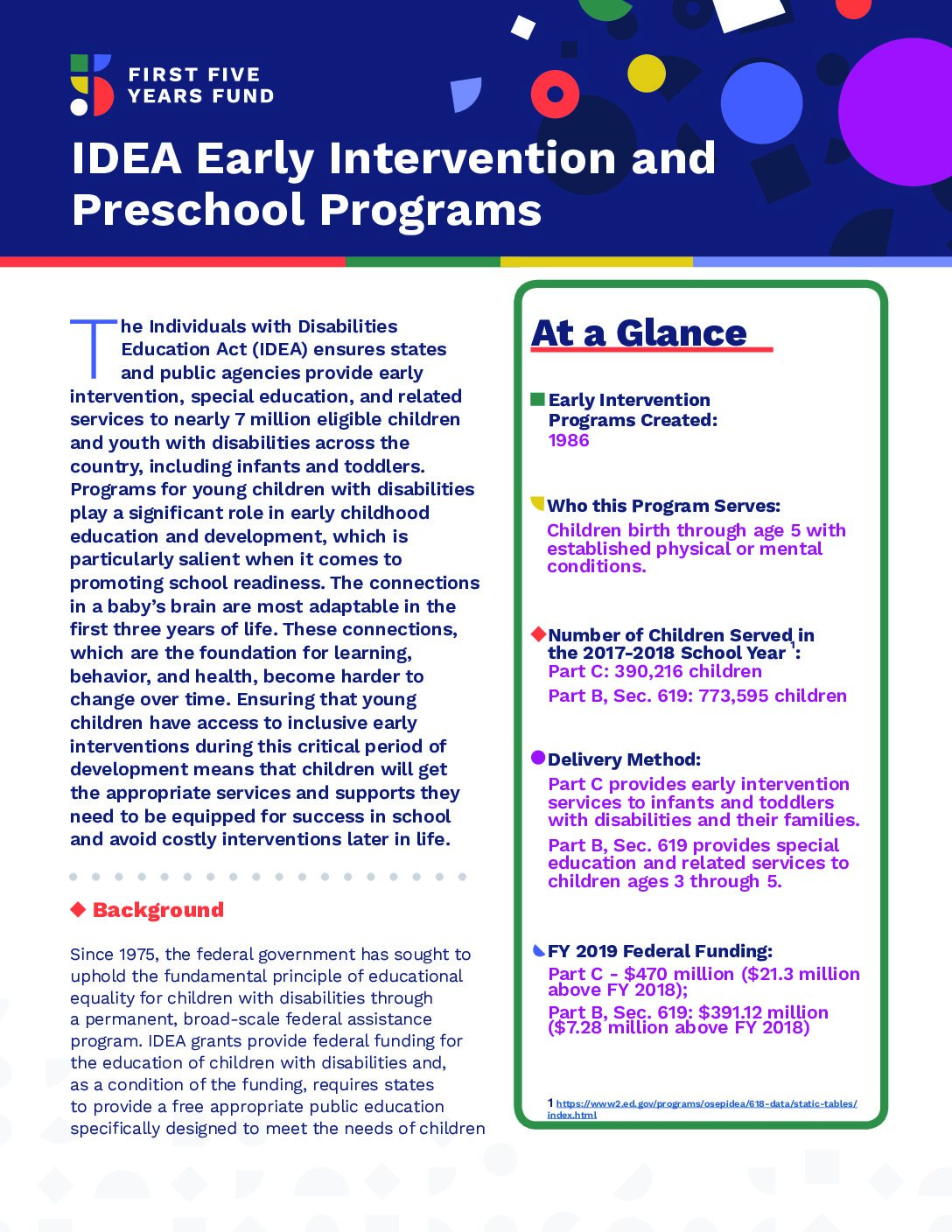IDEA Early Intervention and Preschool Programs
The Individuals with Disabilities Education Act (IDEA) ensures states and public agencies provide early intervention, special education, and related services to more than 7 million eligible children and youth with disabilities across the country, including infants and toddlers. Programs for young children with disabilities play a significant role in early childhood education and development, which is particularly salient when it comes to promoting school readiness.
The connections in a baby’s brain are most adaptable in the first three years of life. These connections, which are the foundation for learning, behavior, and health, become harder to change over time. Ensuring that young children have access to inclusive early interventions during this critical period of development means that children will get the appropriate services and supports they need to be equipped for success in school and avoid costly interventions later in life.
Since 1975, the federal government has sought to uphold the fundamental principle of educational equality for children with disabilities through a permanent, broad-scale federal assistance program. IDEA grants provide federal funding for the education of children with disabilities and, as a condition of the funding, requires states to provide a free appropriate public education specifically designed to meet the needs of children with disabilities at no cost to their parents.

IDEA Part B covers special education for children and youth with disabilities between the ages of 3 and 21. IDEA also contains two programs specifically designed to serve younger children with disabilities: IDEA Part C, which authorizes federal funding for early intervention services to infants and toddlers with disabilities ages birth to three years; and IDEA Part B, Section 619, which authorizes supplementary grants to states for preschool programs serving children with disabilities ages three through five.
Part C aids states in creating and maintaining “a statewide, comprehensive, coordinated, multidisciplinary, interagency system that provides early intervention services for infants and toddlers with disabilities and their families.” Services focus on children experiencing, or who have a high probability of experiencing, “developmental delay” and are outlined for each child and his or her family in an Individualized Family Service Plan (IFSP). Early intervention services may include audiology, vision, speech-language pathology, and psychological services; physical therapy; provision of assistive technology devices; and social work, referral, and coordination services. To the maximum extent feasible, services are to be provided in “natural environments,” including the home, with other infants and toddlers who are not disabled. This element of inclusion helps children and their families feel like important and accepted members of their community and leads to positive social relationships and friendships, as well as development and learning to reach their full potential. If the developmental delay has not been resolved by age 3, a child may continue receiving services under Part B, Sec. 619.
Unfortunately, funding for Part C and Part B, Section 619 has not kept pace with the number of students requiring services. Funding for Part C reached a high point in 1999 with funding at $1,768 per child, which, adjusted for inflation, decreased to just $645 per child by 2017. Similarly, funding for Section 619 was at a high in 1992, $1,484 per child, which, adjusted for inflation, decreased to $529 per child by 2017.

In the 117th Congress, Congressman Mark DeSaulnier (D-CA), Rodney Davis (R-IL), and Jared Huffman (D-CA) introduced the Funding Early Childhood is the Right IDEA Act, which would increase appropriations between FY2023 and FY2027 to ensure full funding for critical early intervention and educational supports. A companion bill was also introduced in the Senate.
Current Funding Level:
- IDEA Part B Preschool Grants are funded at $409,549,000, an increase of $11,929,000 over FY2021.
- IDEA Part C Grants for Infants and Families are funded at $496,306,000, an increase of $14,456,000 over FY2021.
Subscribe to FFYF First Look
Every morning, FFYF reports on the latest child care & early learning news from across the country. Subscribe and take 5 minutes to know what's happening in early childhood education.




